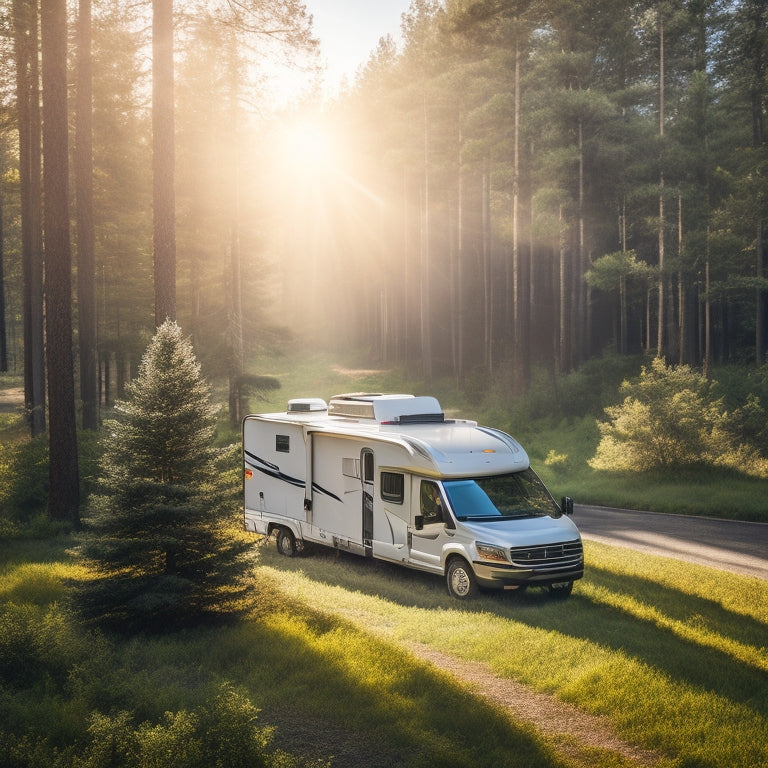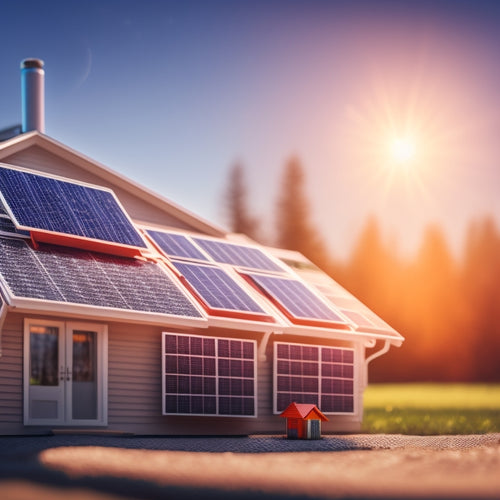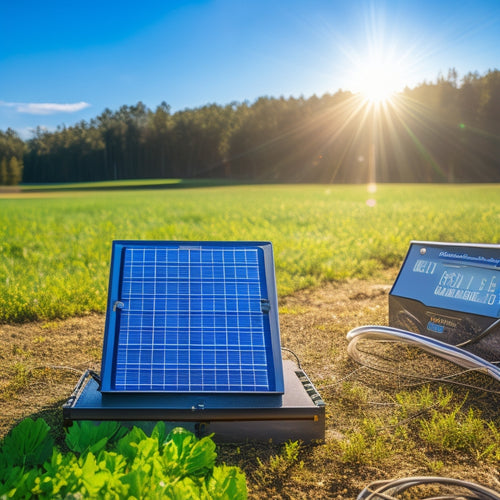
10 Tips for RV Off-Grid Power Freedom
Share
As you shift to off-grid power freedom in your RV, start by evaluating your power needs to determine the required solar panel quantity and battery capacity. Choose high-efficiency solar panels and deep cycle batteries suitable for renewable energy systems. Guarantee safe and efficient charging with a correctly sized charge controller and a well-designed power distribution system. Monitor your energy consumption in real-time to identify inefficiencies and optimize system performance. By following these guidelines and considering factors like wiring safety, excess energy storage, and regular maintenance, you'll be well on your way to achieving off-grid power freedom - and there's more to investigate in the world of RV power independence.
Overview
- Accurately assess your power needs by calculating total wattage for simultaneous appliance use and identifying must-have appliances for battery capacity.
- Choose the right solar panels by prioritizing efficiency, considering panel types, and balancing cost, performance, and aesthetic choices.
- Select deep cycle batteries that meet your energy needs, considering cycle life, depth of discharge, and charging needs, and look for solar batteries designed for renewable energy systems.
- Ensure safe and efficient charging of batteries with a suitable charge controller, considering power management strategies and system compatibility.
- Regularly monitor your power usage to identify inefficiencies, adjust habits, and optimize system performance, and maintain your off-grid system through load analysis and troubleshooting.
Assessing Your RV's Power Needs
Evaluating your RV's power needs involves calculating the total wattage required to run all your appliances simultaneously, considering factors like usage patterns, battery capacity, and charging capabilities.
You'll want to analyze your energy consumption and identify areas for power efficiency improvements. To avoid underestimating your power needs, like 85% of RV owners, prioritize must-have appliances and calculate necessary battery capacity based on daily energy usage, appliance wattage, and frequency of use.
Your lifestyle habits, appliance usage, and seasonal variations all impact your power requirements. For off-grid living, it's crucial to optimize your energy usage to minimize drain on your batteries.
Conducting regular energy audits will help you identify opportunities for improvement. Additionally, understanding solar incentives and their impact on your battery lifespan will inform your power optimization strategy.
Choosing the Right Solar Panels
You'll need to assess your energy requirements to determine the number of solar panels required to meet your RV's power needs.
When selecting solar panels, you should prioritize efficiency, as it directly impacts the amount of power generated per hour of sunlight.
High-efficiency solar panels exceeding 20% efficiency can optimize energy generation, making them ideal for off-grid RV living.
Assessing Energy Requirements
About 300-400 watt-hours of daily energy consumption is a common benchmark for most RVers, but your specific needs may vary greatly. To determine your energy requirements, calculate the total power consumption of your appliances and devices. Consider your lighting, laptop, refrigerator, and other essentials. You may need to adjust your energy usage habits to achieve power efficiency.
| Appliance | Daily Energy Consumption (Wh) |
|---|---|
| Laptop | 60-100 |
| LED Lighting (5 lights) | 40-60 |
| Refrigerator (small) | 100-150 |
Selecting Efficient Panels
With your energy requirements in mind, it's time to focus on utilizing the power of the sun to meet those needs. When selecting efficient panels, consider panel efficiency, which affects the amount of energy generated per hour of sunlight. You'll want to choose solar panels with high efficiency ratings, typically above 20%.
Make certain the panels you select can efficiently recharge your RV batteries, and research manufacturers for reliability and customer support warranty options.
There are two main solar panel types: monocrystalline and polycrystalline. Monocrystalline panels are more efficient but pricier, while polycrystalline panels offer a better cost-to-efficiency ratio.
Installation techniques, environmental factors, and panel orientation also impact performance. Balance cost considerations with aesthetic choices, making sure your system blends with your RV's design.
Selecting Deep Cycle Batteries
When selecting deep cycle batteries for your RV off-grid power system, you'll encounter various battery type options, including flooded, AGM, and lithium-ion, each with its own strengths and weaknesses.
You'll need to evaluate factors like cycle life, depth of discharge, and charging requirements to choose the right battery for your needs.
Additionally, you should also assess the maintenance needs of your chosen battery type, as some require regular watering and equalization charging, while others are largely maintenance-free.
Battery Type Options
You're faced with a multitude of deep cycle battery options, each boasting its unique strengths and weaknesses.
When choosing the right battery for your off-grid RV power system, consider lithium batteries for their high energy density, long lifespan, and low maintenance. AGM batteries, on the other hand, offer a more affordable option with similar performance to flooded batteries, but with reduced maintenance needs.
If you're planning to utilize solar power, look for solar batteries specifically designed for renewable energy systems.
When evaluating battery options, consider factors such as battery capacity, lifespan, and technology. Research reputable battery brands and read reviews to verify you're getting the best value for your investment.
Battery Maintenance Needs
Choosing the appropriate deep cycle battery is only half the struggle; maintaining it properly is equally important to guarantee peak performance and longevity.
You'll need to establish a maintenance schedule to confirm your battery's lifespan isn't cut short. This includes monitoring charging habits, preventing corrosion, and checking electrolyte levels regularly.
Keep an eye on temperature effects, as extreme temperatures can impact performance. Conduct capacity testing regularly to identify any potential issues.
Verify terminal connections are secure and clean to prevent electrical resistance. Finally, consider recycling options when your battery reaches the end of its life.
Understanding Charge Controllers Role
The charge controller plays an essential role in your RV's off-grid power system, as it guarantees your deep cycle batteries are safely and efficiently charged from your solar panel array or wind turbine.
You'll need to choose from various charge controller types, such as MPPT, PWM, and shunt controllers, each with distinct features that impact solar power efficiency.
When selecting a charge controller, consider power management strategies, system compatibility, and battery charge optimization.
Make certain your controller integrates seamlessly with your renewable energy source and energy storage solutions.
Proper configuration of your solar array is also vital, so take the time to research and understand the ideal setup for your off-grid setup.
Sizing Your Solar Power System
You'll need to accurately assess your power needs to determine the size of your solar power system, bearing in mind factors like your RV's energy usage, desired autonomy, and available roof space.
Next, you'll calculate the required panel size based on your power needs, considering the solar panel's efficiency, local solar irradiance, and temperature coefficients.
Assessing Power Needs
Evaluating your power needs is essential in determining the right size of your solar power system. You need to understand your energy consumption patterns to guarantee you have a reliable off-grid power setup. Start by tracking your daily energy usage, including lights, appliances, and devices. Consider your power management habits, such as charging your batteries during the day and using energy-efficient devices.
| Appliance | Average Daily Energy Consumption |
|---|---|
| Laptop | 0.5 kWh |
| LED Lights | 0.2 kWh |
| Refrigerator | 1.5 kWh |
| Water Pump | 0.8 kWh |
Calculating Panel Size
To accurately size your solar power system, calculating panel size is crucial, as it directly affects the system's overall performance and reliability.
You'll need to take into account several factors, including your daily energy requirements, panel orientation, and sunlight exposure. Since you're on the move, you'll want to prioritize flexibility and adjustability in your panel setup.
Calculate your minimum required panel size by dividing your daily energy needs by the peak sun hours in your area.
Don't forget to factor in efficiency losses and additional energy needs during periods of low sunlight.
Mounting Solar Panels on Roof
Most RV rooftops can accommodate a few hundred watts of solar panels, making it an ideal location for capturing renewable energy.
When planning solar panel placement, consider the roof's structural integrity to guarantee safe and secure mounting. You'll want to avoid areas with obstructions, such as vents, skylights, or antennas, and opt for a spot with minimal shading.
Typically, the roof's center section is the best location, as it provides a solid anchor point and allows for easy cable routing. Use a durable, weather-resistant mounting system specifically designed for RV roofs, and always follow the manufacturer's instructions.
Properly mounted solar panels will provide you with the freedom to generate power off-grid, wherever your journeys take you.
Wiring and Electrical Safety
When you're designing your off-grid power system, keeping electrical safety top of mind is vital, as faulty wiring can lead to electrical shock, fires, or even fatalities. To guarantee your system is safe and reliable, you'll need to focus on proper wiring, circuit protection, and electrical grounding.
| Safety Aspect | Description | Tips |
|---|---|---|
| Wiring Diagrams | Accurate diagrams guarantee correct connections | Use standardized symbols and color-coding |
| Circuit Protection | Protects against overcurrent and short circuits | Install fuses or circuit breakers with correct amp ratings |
| Electrical Grounding | Prevents electrical shock and fires | Use a grounding bus and connect to a grounding rod |
Additionally, consider safety protocols like voltage regulation, fuse placement, and wire gauge selection. Verify appliance compatibility and have troubleshooting techniques in place. Finally, design a power distribution system that meets your energy needs while prioritizing safety.
Monitoring Your Power Usage
As you rely more heavily on your off-grid power system, tracking your energy consumption becomes essential to ensuring you have a steady supply of power.
You need to know exactly how much energy you're using and when, so you can adjust your habits and optimize your system. Effective power monitoring involves installing a monitoring system that provides real-time data on your energy usage.
This allows you to identify areas of inefficiency and make adjustments to reduce your consumption. With accurate energy tracking, you can pinpoint which appliances are using the most power and make informed decisions about when to use them.
Storing Excess Energy Efficiently
One essential aspect of off-grid power systems is storing excess energy efficiently, which requires a well-designed battery bank and a reliable charging system. You'll want to guarantee your energy storage system can handle the fluctuating power output from your renewable sources. To achieve this, focus on power management, battery integration, and inverter selection. Proper load balancing and energy conservation strategies will help minimize waste and maximize your energy independence. Consider implementing backup systems and peak shaving techniques to further optimize your setup.
| Energy Storage Considerations | Key Benefits |
|---|---|
| Deep Cycle Batteries | Optimized for off-grid energy storage |
| Lithium-Ion Batteries | High energy density and long lifespan |
| Battery Management Systems | Advanced monitoring and control capabilities |
| Inverter/Chargers | Efficient power conversion and charging |
| Redundancy and Backup | Guarantees continuous power availability |
Maintaining Your Off-Grid System
Your off-grid power system's performance relies heavily on efficient energy storage, but it's equally important to maintain this system to guarantee continuous power availability.
You'll need to perform regular load analysis to identify areas for efficiency improvements and optimize your power management strategy.
Stay vigilant for signs of wear and tear, and develop troubleshooting techniques to quickly address any issues that arise.
Consider system upgrades, such as inverter selection, to ensure seamless integration with your renewable sources.
Frequently Asked Questions
Can I Use Regular Car Batteries for Off-Grid Power Storage?
You can use regular car batteries for off-grid power storage, but they're not ideal; they're designed for high-current, short-duration starts, not deep-cycle, long-term power capacity, so you'll need specialized deep-cycle batteries for reliable off-grid energy independence.
Will Solar Panels Still Charge on Cloudy or Rainy Days?
You'll find that solar panels still generate power on cloudy or rainy days, albeit at reduced efficiency; modern panels maintain around 10-20% of their peak output in cloudy weather, ensuring some energy storage despite compromised solar panel efficiency.
How Often Should I Equalize My Deep Cycle Batteries?
You should equalize your deep cycle batteries every 1-3 months, depending on charging frequency and usage, as part of regular battery maintenance, to prevent sulfation and guarantee peak performance and longevity.
Can I Connect Multiple Solar Panels in Series or Parallel?
When designing your solar panel configurations, you'll need to decide between series vs parallel connections. You'll want to evaluate voltage, current, and power output when making this decision, as it'll impact your overall energy harvesting and storage capabilities.
Do I Need a Generator if I Have Solar Panels Installed?
You don't necessarily need a generator if you have solar panels, but it depends on your energy demands and solar panel efficiency; consider generator alternatives like lithium-ion batteries or wind turbines to guarantee reliable off-grid power.
Ready to Buy
You've finally cracked the code to RV off-grid power freedom! With these 10 tips, you've got the keys to open up a life of independence from the grid. Your solar panels are humming, your batteries are charged, and your electrical system is purring like a well-oiled machine. Remember, maintaining your off-grid system is like tending to a garden - regular care guarantees a bountiful harvest of power. Now, hit the open road and enjoy the sweet taste of energy independence!
Related Posts
-

How to Achieve a Zero-Waste Lifestyle for a Greener Tomorrow
To achieve a zero-waste lifestyle, start by adopting the principles of refusing, reducing, reusing, and recycling. Sw...
-

A Beginner's Guide to Navigating the Solar Investment Tax Credit
You're eligible to claim a significant Solar Investment Tax Credit (ITC) of 30% of total installation costs, but mane...
-

Choosing the Right Solar Power Charge Controller
Choosing the right solar power charge controller is crucial for maximizing energy efficiency and extending battery li...


